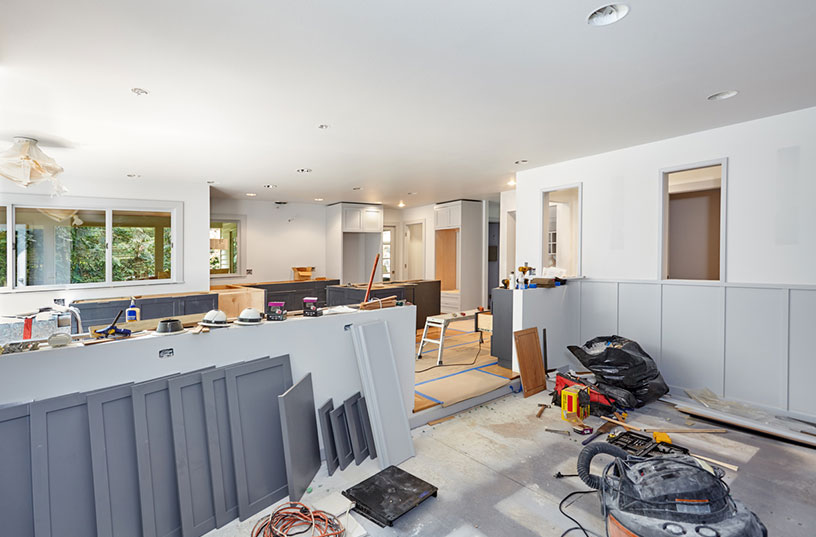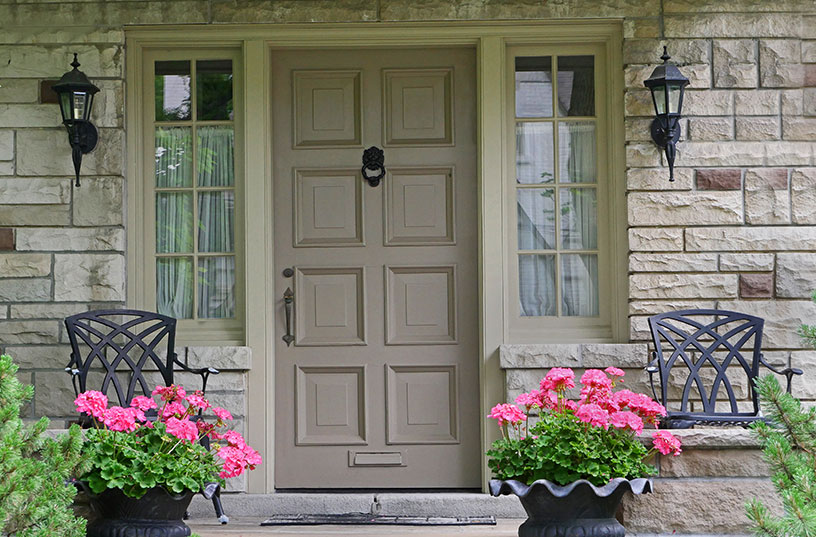Have you ever stood in the middle of your kitchen and envisioned new cabinets and a granite countertop? Or perhaps you’ve dreamed of replacing your outdated bathroom fixtures and tub with something sleek and modern. Eventually even the most well-loved home may start to feel tired and in need of a face-lift. For many people the question becomes, “Should I invest in renovations or sell the house, start fresh, and let the new owners tackle these projects?” If you’ve ever watched the television show “Love it or List It,” you know that the decision can be a difficult one.
These days, a large number of people are choosing to renovate rather than move. This trend began during the pandemic, when millions of people were stuck at home and focused on making improvements. As a result, the U.S. remodeling market hit an all-time high of $567 billion in 2022. While this initial surge has slowed a bit, research shows that many people are still renovating instead of moving, due to a challenging housing market.
The number one reason is higher interest rates. This is especially true for homeowners who are locked into historically low mortgage rates of about 3%. The prospect of switching to a rate of 6% or higher makes it cheaper, in many cases, to renovate than buy a bigger, more expensive home or build a new home. In fact, there has been an increase in complete kitchen and bath renovations, as homeowners opt to stay in their current homes indefinitely. Of course, this creates a low inventory of houses for sale and rising home prices, making the housing market even more challenging!
And this trend seems to be here to stay: According to Houzz, about 62% of homeowners are planning renovations and expect to spend an additional 11 years in their current homes! This study also revealed that the most popular remodeling job is still a kitchen overhaul (29% of renovators), followed closely by guest bathrooms (27%), and primary bathrooms (25%). Outdoor projects, such as decks and patios, also remain popular.
Should You Stay or Should You Go?
While the trend today is staying put, that doesn’t mean it’s the right decision for everyone. There are many factors to consider before you invest in renovations or put your home on the market.
Home condition
Before embarking on any renovations or repairs, it’s wise to evaluate the overall condition of the home. There is a big difference between making cosmetic changes and replacing roofs or crumbling foundations. Sure, it’s more satisfying to remodel an outdated bathroom than purchasing a new roof, but it’s important to prioritize. Begin by making a list of what’s necessary (high priority) versus what you’d like to do (lower priority). Then gather estimates for these projects so you have a realistic picture of costs. Depending on what needs to be done, it may be cheaper to move. This will depend on your current mortgage situation, how much money you have in savings or your ability to finance improvements.
Costs/finances
Renovations can be expensive – the average cost to remodel a kitchen is approximately $27,000 and the average home remodel is $48,002– and you don’t always recoup your investment when you sell. However, if you plan on staying in your home for years, you can enjoy the renovations (priceless!). Of course, this also depends on your financial situation (see above). Renovations require immediate out-of-pocket expenditures, while moving can put money in your pocket now, but cost more down the line. Creating a realistic budget is the most important first step you can make. Once you have a budget, you must determine whether you have enough in savings or whether you are willing to take out a loan to finance renovations. Talking with a financial consultant or a qualified real estate agent can help you with these decisions.
Location
If you love your home, neighborhood, and schools, renovating might be the best choice. In other words, why mess with a good thing? Do an honest assessment of your feelings. If you have a strong connection with your neighbors and your community, and an emotional attachment to your home, then now may not be the time to move.
Real estate market
Be sure to do some research about the market conditions for the area where you currently live, as well as the area(s) you’re considering with a potential move. Again, talking to a trusted agent can help you evaluate current market conditions and whether it makes sense to make a move. Some questions to consider include:
- Are mortgage rates trending high or low?
- How is the inventory of homes?
- Is it a buyer’s or seller’s market?
- What is the pace of sales – how long are listings remaining active?
- How does the cost of buying a house in your neighborhood compare to labor/contractor costs?
Equity
If you’ve been in your home for a long time and have a lot of equity, you can use this investment to upgrade with a home equity loan. On the other hand, if your home is worth considerably more now than when you bought it, it may be a good time to sell. Ideally, you should have enough equity to pay off your current mortgage, cover all closing costs, pay for moving expenses and put a down payment on the new home.
Needs
If your family is growing and you need more room, this type of renovation may be impossible or too costly. Likewise, if your wish list includes a bigger yard, moving may be the only option. However, if your kitchen feels too cramped or you need an office space, there may be some creative solutions. Sometimes changing the layout of an existing home will provide the extra room you need or make your home more functional. Talking to an architect can help you determine whether there is a feasible fix. Another thing to consider here is whether you “need” to downsize. If you’re having trouble maintaining your home due to the size of the house and the property, it may make more sense to move than remodel.
Timing
There are many factors to consider when it comes to timing. If you’re still working, what is your current commute like? Are you willing to make it longer, or perhaps moving would improve the situation. Are the kids still in school? Do you need to set aside money for college savings? Are you preparing for retirement and hoping to downsize and reduce costs? Making a list of pros and cons can help you make the decision that’s right for this life stage.

Decide What’s Right for You
As you can see, deciding between renovating or moving is complicated. There is no right or wrong answer for everyone. The important thing is to decide what’s best for you at this point in your life. Moving is expensive, but so is renovating. Remodeling projects involve a lot of stress, but so does moving. Each decision comes with a list of pros and cons, which are often different for each homeowner. While finances is typically the biggest factor to take into account, it’s also important to consider your emotions and how you feel about your current home and community. Still undecided? Try talking to a real estate agent who can help you create a plan that works for you.










